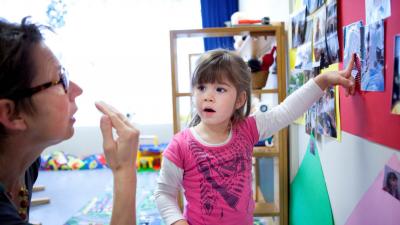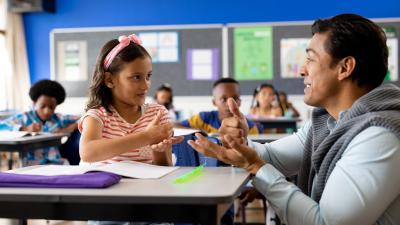One of Kentalis' fields of expertise is deafness and hard-of-hearing. Learn more about this topic and how Kentalis in the Netherlands works for people who are deaf or hard-of-hearing.
People with hearing loss can be divided into four categories: the early deaf, the sudden deaf, the late deaf, and the hard-of-hearing.
Those with early deafness are generally born deaf or lose their hearing before the age of three.
In contrast, people with sudden deafness abruptly lose their hearing within a short amount of time sometime after toddlerhood.
The late deaf also lose their hearing later in life, but this tends to happen gradually over a period of years.
People who are hard-of-hearing generally retain some residual hearing, but, similar to the deaf, often experience issues with auditory processing.
Deafness can be measured and classified:
- light: 20 – 40 dB
- moderate: 40 – 60 dB
- severe: 60 – 90 dB
- profound: > 90 dB
Functional diversity
The community of deaf and hard-of-hearing (DHH) people is incredibly diverse. This holds not only with respect to their development and the extent of their hearing loss, but also to their use of hearing aids, preferences for language and communication, (language) background, education, and their need for support in different life domains. There is, in other words, a great deal of functional diversity.
DHH people tend to experience limitations in their daily lives to a greater extent than hearing individuals. These constraints are mostly related to the consequences of insufficient access to communication during the developmental years. Such a lack of communication can affect both language learning and cognitive and social-emotional development. In addition, the dominant position of sound and spoken languages in most societies can lead to barriers in social domains, such as education, work, leisure, family life, friendships, and relationships.

Kentalis Academy
Kentalis Academy conducts research and develops professional, evidence-based training and applications for care and education in the Netherlands. To this end, they engage in collaboration with healthcare professionals, educational departments, and advocacy groups of DHH individuals and their parents.
Within the DHH research program, they analyze both personal characteristics and social barriers, and explore the intersectional aspects of being DHH in an environment where sound is the dominant means of communication. In particular, the focus is on counteracting the risks associated with the consequences of hearing loss (e.g., developmental problems) and promote the beneficial aspects of being deaf or hard-of-hearing (e.g., identifying with the larger community of DHH people, sign language). Kentalis Academy additionally develops evidence-based training modules for parents and professionals to increase the quality of interaction and communication with DHH children and share our insights on creating an inclusive environment with social parties such as schools, sports clubs, employers, and government institutions.

Projects and tools
Kentalis' research program on deaf and hard-of-hearing (DHH) people focuses on both children, adolescents, and adults. Below we present examples of projects that cover these different age groups.
Early Speech Perception as Predictor for Lexical Development
Congenital or early acquired hearing loss involves a risk of problems and/or delays in spoken language development due to limited access to the spoken language. In this project, we develop an early, reliable, and low-impact measure to specifically predict spoken language competence in children with congenital and early hearing loss. This assessment tool aims to screen for children who are at risk to increase the effectiveness of interventions and therapy.
PSYWEL
DHH children are at risk for psychological problems. That is why Kentalis has developed a program: Psywel, short for psychological well-being. In this project, DHH children and adolescents in our educational programs are screened for psychological problems every two years. When necessary, DHH children and adolescents subsequently receive treatments in general mental health programs or Kentalis’ care programs. In the last three years, we have piloted the screening of Psywel in three Dutch organizations (with success). We have also conducted a large-scale study on the prevalence of psychological problems among DHH in children and adolescents in our special schools. And we have worked on informational material on psychological problems in deaf and hard-of-hearing children and adolescents for parents, professionals, and for DHH children and adolescents.
Publications
This section features a selection of (scientific) publications on deafness and hard-of-hearing, published by Kentalis researchers. Click on the article link to read the full publication.
Articles
Wauters, L. & Dirks, E. (2024). Interactive storybook reading to enhance language, literacy, and social–emotional skills. The Journal of Deaf Studies and Deaf Education, 29(2), 286–287. doi.org/10.1093/deafed/enae003
Couvee, S., Wauters, L., Knoors, H., Verhoeven, L., & Segers, E. (2023). Predicting variation in word decoding development in deaf and hard-of-hearing children. Reading and Writing. doi.org/10.1007/s11145-023-10444-0
Wauters, L., Pagliaro, C. M., Kritzer, K. L., & Dirks, E. (2023). Early mathematical performance of deaf and hard of hearing toddlers in family-centred early intervention programmes. Deafness & Education International, 26(2), 190-207. doi.org/10.1080/14643154.2023.2201028
Couvee, S., Wauters, L., Verhoeven, L., Knoors, H., & Segers, E. (2022). Predicting early literacy: auditory and visual speech decoding in deaf and hard-of-hearing children. Journal of Deaf Studies and Deaf Education, enac019. doi.org/10.1093/deafed/enac019
Wauters, L., DesJardin, J., & Dirks, E. (2021). Supporting school readiness skills and home literacy environment in young children who are deaf and hard of hearing. In S.R. Easterbrooks & H.M. Dostal (Eds.), The Oxford Handbook of Deaf Studies in Literacy (pp. 201-215). New York: Oxford University Press.
Lammertink, I., Hermans, D., Stevens, A., van Bakel, H., Knoors, H., Vissers, C., & Dirks, E. (2021). Joint attention in the context of hearing loss: A meta-analysis and narrative synthesis. Journal of Deaf Studies and Deaf Education, 27(1), 1–15. doi.org/10.1093/deafed/enab029
Wauters, L., van Gelder, H., & Tijsseling, C. (2021). Simple View of Reading in deaf and hard-of-hearing adults. Journal of Deaf Studies and Deaf Education, 26(4), 535–545. doi.org/10.1093/deafed/enab020
Roze, K.C.M., Tijsseling, C., Rudd, B., & Tiemens, B.G. (2020). Measuring Recovery in deaf, hard-of-hearing, and tinnitus patients in a mental health care setting: Validation of the I.ROC. Journal of Deaf Studies and Deaf Education, 25(2), 178-187. doi.org/10.1093/deafed/enz043
van Berkel-van Hoof, L., Hermans, D., Knoors, H., & Verhoeven, L. (2020). Sign effects in spoken word learning by oral deaf and hard-of-hearing children, and by hearing children. First Language, 40(3), 300-325. doi.org/10.1177/0142723720921058
Blom, H., Segers, E., Knoors, H., Hermans, D., & Verhoeven, L. (2019). Comprehension of networked hypertexts in students with hearing or language problems. Learning and Individual Differences, 73, 124-137. doi.org/10.1016/j.lindif.2019.05.006
Dirks, E. & Wauters, L. (2018). It takes two to read: Interactive reading with young deaf and hard-of-hearing children. Journal of Deaf Studies and Deaf Education, 23(3), 261–270. doi.org/10.1093/deafed/eny005
Blom, H., Segers, E., Hermans, D., Knoors, H., & Verhoeven, L. (2017). Hypertext comprehension of deaf and hard-of-hearing students and students with specific language impairment. Research in Developmental Disabilities, 61, 127-137. doi.org/10.1016/j.ridd.2016.12.014
Wauters, L. & Dirks, E. (2017). Interactive reading with young deaf and hard-of-hearing children in eBooks versus print books. Journal of Deaf Studies and Deaf Education, 22(2), 243–252. doi.org/10.1093/deafed/enw097
Books
Marschark, M. & Knoors, H. (2020). The Oxford handbook of deaf studies in learning and cognition. Oxford University Press. doi.org/10.1093/oxfordhb/9780190054045.001.0001
Marschark, M., Antia, S., & Knoors, H. (2019). Co-enrollment in deaf education. Oxford University Press. doi.org/10.1093/oso/9780190912994.001.0001
Knoors, H. & Marschark, M. (2018). Evidence-based practices in deaf education. Oxford University Press. doi.org/10.1093/oso/9780190880545.001.0001
Knoors, H. & Marschark, M. (2015). Educating deaf learners: Creating a global evidence base. Oxford University Press. doi.org/10.1093/acprof:oso/9780190215194.001.0001
Knoors, H. & Marschark, M. (2014). Teaching deaf learners: Psychological and developmental foundations. Oxford University Press. doi.org/10.1093/acprof:oso/9780199792023.001.0001
Marschark, M., Tang, G., & Knoors, H. (2019). Bilingualism and bilingual deaf education. Oxford University Press. doi.org/10.1093/acprof:oso/9780199371815.001.0001
Kentalis International Foundation
At Kentalis International Foundation, Kentalis' international NGO, we are exclusively focused on deafness and hard-of-hearing. We work on knowledge exchange projects with universities, disabled people's organizations, and NGOs in the Global South. Read more about our team and our mission.